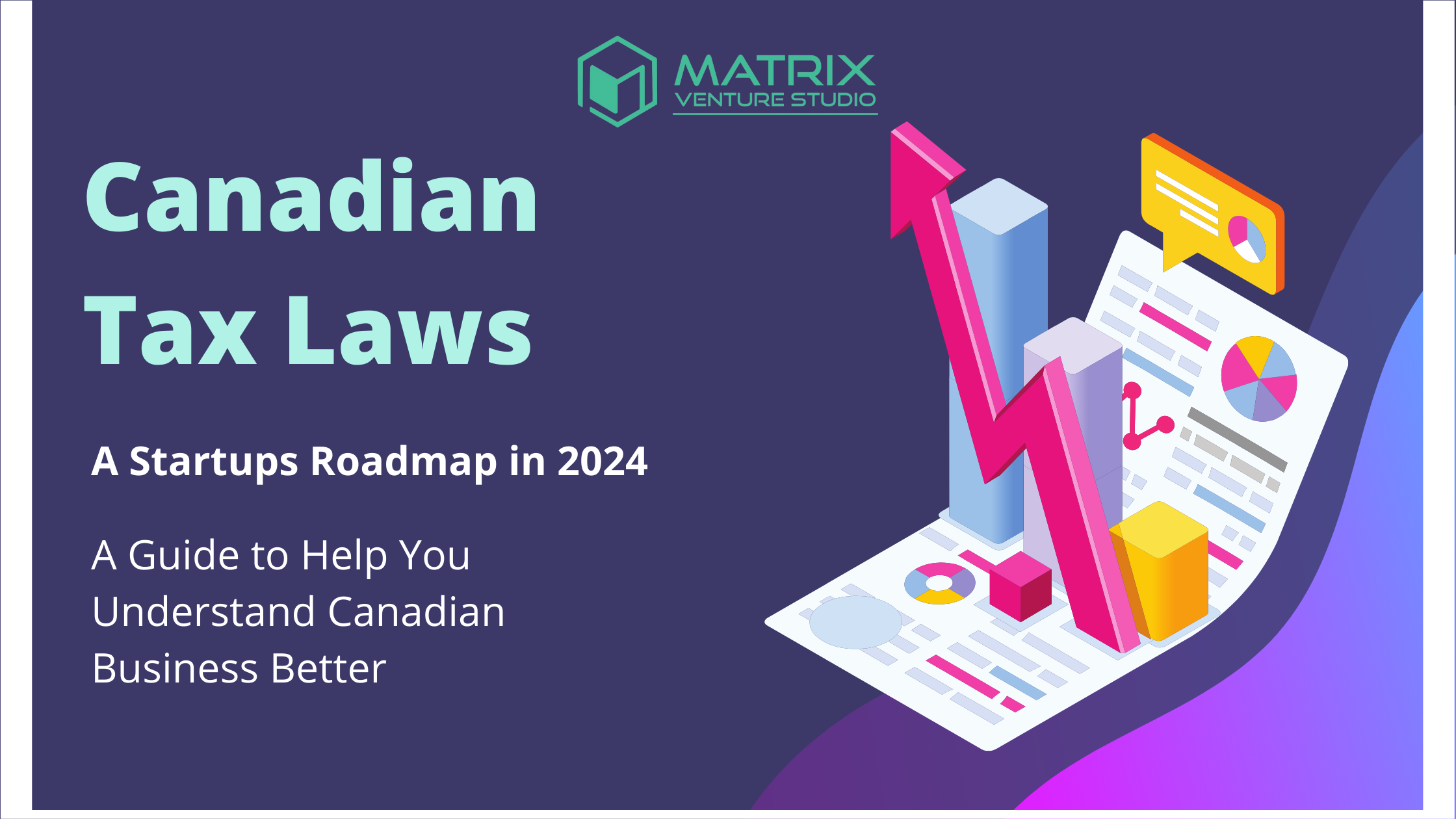Taxes are a big deal for startups. Besides paying the government and being compliant, they enable smart financial planning.
A solid tax strategy helps startups use their resources wisely and avoid expensive mistakes, which is crucial for long-term success, ensuring long-term success.
When you're a startup from another country trying to make it in Canada, you may find Canadian tax laws more complex. This guide will help your business understand and effectively manage its tax obligations in Canada.
Read on to make your startup thrive while staying compliant.
Apply for Your Business Number
Under tax laws in Canada, businesses are required to obtain a Business Number (BN). The Business Number serves as a unique identifier for your company. This 9-digit unique number is crucial for various financial and regulatory purposes.
How to Get Your Business Number?
There are 3 ways to get your Business Number in Canada:
- You can apply for your business number online
- You can apply through email by filling up the RC1 form.
- You can apply through a phone call on their business inquiries line.
However, there's one exception to keep in mind. If your business is located in Quebec, register with Revenu Québec (if you’re not a selected listed financial institution (SLFI) for GST/HST or QST purposes or both).
Determine Your Corporate Tax Year-End
Your fiscal year can cover any continuous 12-month period. The only real rule is that your first tax year-end must happen within 53 weeks of the day you incorporated your company.
You're not required to declare your financial year until your initial T2 corporate tax return. To prevent interest or penalties, declare it within 3 months if you owe tax or within 6 months if you don't.
How to Choose Your Tax Year-End?
Delaying your initial tax return under the tax laws in Canada can help you manage expenses early in your business. For instance, if you incorporated on September 1, 2021, opt for a year-end of August 31 to postpone your first return to November 30, 2022 (if taxes are owed) or Feb 28, 2023 (if not).
Align bonuses with your fiscal year-end for tax planning benefits. If your business in Canada has seasonal peaks, select a year-end that allows time for record-keeping and performance evaluation.
Modifying Your Tax Year-End
Changing your financial year once declared can affect GST/HST filings and deadlines. If still needed, write to the CRA, explaining your reasons for approval. Note that you don’t need approval if your change stems from:
- relocating
- acquisition
- tax exemption status change
- final corporate return filing for a shortened tax year due to specific circumstances
Best Practices: Corporate Tax Year-End
For maintaining clean and organized financial records, select the last day of a month as your year-end date, ideally aligning it with your GST/HST reporting period. This synchronization simplifies tax reporting and ensures a smoother financial management process under Canadian tax laws.
In most cases, selecting the month-end closest to 53 weeks from your incorporation date as your corporate fiscal year-end is prudent. This delay helps defer your initial tax liability and enables better utilization of tax benefits and planning options.
File GST/HST
How often you must file GST/HST (Goods and Services Tax/Harmonized Sales Tax) returns — monthly, quarterly, or annually — depends on your Canadian business size.
Ensure you're accurately reporting your gross revenues, the GST/HST you've collected, and the amounts you've paid out.
Here is a table specifying the payment schedules under the tax laws in Canada with deadlines:
| Payment Schedule | Payment Deadline | Filing Deadline |
|---|---|---|
| Monthly | One month after the end of the reporting period | One month after the end of the reporting period |
| Quarterly | One month after the end of reporting period | One month after the end of the reporting period |
| Annually (listed financial institutions except for persons that are listed financial institutions only because they have a section 150 election in effect) | 6 months after fiscal year-end | 6 months after fiscal year-end |
| Annually (individuals without a December 31 fiscal year-end and business income for income tax purposes) | 3 months after fiscal year-end | 3 months after fiscal year-end |
| Annually (individuals with a December 31 fiscal year-end and business income for income tax purposes) | April 30 | June 15 |
Due Dates
Your due date depends on your reporting period, and you'll find the exact due date on your personalized GST/HST return (Form GST34-2).
You must file a GST/HST return even if your business has no transactions or you don't owe any net tax. If your due date is on a weekend or CRA-recognized holiday, timely payments are accepted on the following business day.
Refund or Rebate Holding
The CRA can hold onto any GST/HST refunds or rebates you should be getting until it gets all outstanding returns and amounts. And if you're running a sole proprietorship or partnership, your personal income tax refund can also get held up until everything's squared away with the CRA.
Manage Payroll Deductions
Most businesses opt for a biweekly pay frequency, but aligning with your business needs and cash-flow cycles is crucial. Consider factors like paying to date or a week in arrears, and explore options like weekly, monthly, or semi-monthly schedules.
Address taxable employee benefits within each pay cycle. These benefits impact EI premiums, CPP contributions, and income tax deductions, making accurate accounting vital. The CRA's Guide T4130 offers valuable guidance in this regard.
Remitting payroll or "source" deductions are calculated based on the average monthly payments you made in the second year. So, if you're in 2023, you'd look back to 2021.
New employers using the CRA's My Business Account portal can access account details, transactions, and statements electronically. Initially, they are regular remitters, remitting deductions by the following month's 15th day. Over time, they may become quarterly or accelerated remitters, reducing paperwork.
You'll use T4 forms for the calendar year to report salaries and deductions. Make sure to hand them out to your employees and file the same info with the CRA by February 28 of the following year.
Avoid Common Tax Penalties
It’s best to stay on top of filing tax returns, paying taxes, or meeting installment deadlines. Otherwise, your startup business in Canada is in for some penalties.
Here’s a table listing some of the key penalties:
| Situation | Penalties |
|---|---|
| Failure to file penalties | 5% due on filing deadline + 1% per late month, up to a maximum of 12 months |
| Failure to file a penalty in any of the three previous tax years | 10% due on filing deadline + 2% per late month, up to a maximum of 20 months |
| CRA’s demand to file the return under subsection 150 (2) | 10% due on filing deadline + 2% per late month, up to a maximum of 20 months |
| Failure to file penalties for non-resident corporations | $100 or $25/late day up to a maximum of 100 days, whichever is greater |
| Installment penalty, when installment interest > $1,000 | 1/2 (total interest – $1,000) or 25% of interest if no installment payment had been made for the year, whichever is greater |
| Failure to file T2 Corporation Income Tax Return | Any other penalties applicable + 0.0005% of Canadian taxable capital/late month, up to 40 months |
| Failure to file Schedule 38, Part VI Tax on Capital of Financial Institutions (if applicable) | Any other penalties applicable + 0.25% of Part VI tax/late month, up to 40 months |
| Failure to report income ≥ $500 on returns for the current or past three tax years. | 10% of unreported income or 50% of (understated tax – tax withheld), whichever is lesser |
Roadmap Ends, Journey Begins!
Choose a suitable fiscal year-end, fulfill GST/HST obligations, and effectively manage payroll deductions. File and pay your taxes in Canada on time to avoid penalties and interest.
Comply with these steps to navigate Canadian tax law intricacies for entrepreneurial growth and success! Make sure you get your Business Number (BN) to kickstart the process.
To know more about the tax laws in Canada and how to navigate the Startup Visa Program, connect with Matrix Venture Studio at info@matrixventurestudio.com today!





Leave a reply